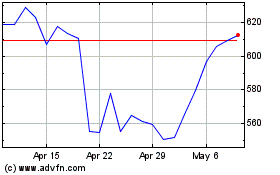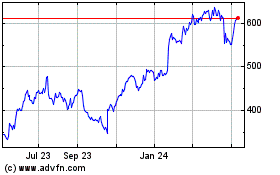By Joe Flint
As a founder and co-chief executive of Netflix Inc., Reed
Hastings has reshaped both the way people watch television and how
the entertainment industry operates.
Launching Netflix in 1997 as a DVD-by-mail movie-rental service
with Marc Randolph, Mr. Hastings grasped early that the internet
was the future of distribution. First with old movies and TV shows
that Hollywood studios and networks were more than happy to sell,
then with original programming such as "House of Cards" and
"Stranger Things," the streaming giant has built a global
subscriber base approaching 200 million households world-wide.
Along the way, Mr. Hastings has built a distinctive -- and, to
some, cutthroat -- corporate culture. The Netflix way encourages
staff to take big risks, typically without the need of approval
from a chain of bosses, and to communicate with blunt candor.
Leaders often practice what is called the "keeper test," in which
they ask themselves: If a staffer were offered a job elsewhere,
would you fight to keep that employee? If the answer is no, the
person is let go.
In his new book "No Rules Rules: Netflix and the Culture of
Reinvention, " Mr. Hastings likens being employed at the streaming
giant to being part of a sports team: Getting cut is disappointing
but carries no shame. "Unlike many companies, we practice: Adequate
performance gets a generous severance package," reads one of
Netflix's mottos.
Mr. Hastings spoke with The Wall Street Journal by video from
his son's bedroom in the family home in Santa Cruz, Calif. Here are
edited excerpts.
WSJ: What elements of the Netflix culture are tougher to
maintain now that so many employees are working from home?
Mr. Hastings: Debating ideas is harder now.
WSJ: Have you seen benefits from people working at home?
Mr. Hastings: No. I don't see any positives. Not being able to
get together in person, particularly internationally, is a pure
negative. I've been super impressed at people's sacrifices.
WSJ: It's been anticipated that many companies will shift to a
work-from-home approach for many employees even after the Covid-19
crisis. What do you think?
Mr. Hastings: If I had to guess, the five-day workweek will
become four days in the office while one day is virtual from home.
I'd bet that's where a lot of companies end up.
WSJ: Do you have a date in mind for when your workforce returns
to the office?
Mr. Hastings: Twelve hours after a vaccine is approved.
WSJ: I like that.
Mr. Hastings: It's probably six months after a vaccine. Once we
can get a majority of people vaccinated, then it's probably back in
the office.
WSJ: In the book you say, "It's impossible to know where a
business like ours will be in five years." What kind of
prognosticating do you do?
Mr. Hastings: We keep trying experiments. The business model
will be pretty similar in five years. Can we figure out animation?
Can we catch Disney in family animation?
WSJ: You've said you want Netflix to be able to pounce on
unanticipated opportunities. What's an example of one you didn't
see coming?
Mr. Hastings: Nonfiction programming is a pretty good one. We
started as superpremium TV, and the expansion into nonfiction has
been a huge success. The whole sharing of content around the world
has been a huge success. Prior to that, people thought Americans
won't watch content that's produced outside the U.S.
WSJ: Netflix is about radical candor. Just how candid can people
be with each other from a personnel-management standpoint?
Mr. Hastings: We want people to be very constructive. We don't
want people to go around like a drunken fool, saying terrible
things to people. We want people to be engaged with positive
intent, to create an environment where people thrive from getting
feedback.
Like when you do push-ups or when you run -- it hurts, but you
know you're getting stronger. You have to think about it in terms
of giving feedback: It's producing enough discomfort for learning,
but not so much discomfort that you're attacking the person or it
feels like that.
WSJ: You write, "Only a CEO who is not busy is really doing
their job." I'm sure a lot of CEOs and their families would beg to
differ. Can you elaborate?
Mr. Hastings: You don't want to be, as CEO, consumed by the
tactics. For me, making casting decisions or product feature
decisions -- there are too many to make. You get too busy so that,
even if you are good at it, you're not thinking about the long-term
health and evolution of the business. You want to really know
what's going on in all kinds of places, but not making
decisions.
WSJ: You recently chose to share the CEO title with Chief
Content Officer Ted Sarandos. The corporate world is littered with
examples of co-CEO structures that haven't worked out well.
Mr. Hastings: It's littered with examples of single CEOs not
working out also. Co-CEOs are an unusual thing, for sure. It only
works well when two people really work well together. Ted and I
have been working together for more than 20 years. He's been a
virtual co-CEO for a couple of years, and we just decided to make
it official.
WSJ: Netflix is known for paying top-of-the-market salaries. Are
you concerned that has driven up costs for you and others in
Hollywood?
Mr. Hastings: When you're looking at great sports teams, they're
often the teams that can pay high for the best players. We want to
have the absolute best players and compensation is one part of
that. We'd rather have three outstanding people than four OK
people.
WSJ: You wrote that value or creative worth shouldn't be
measured by time and that you've never paid attention to the hours
people are working. Yet many people at Netflix describe it as a
24/7 lifestyle. Does the lack of work-life balance or potential for
burnout concern you?
Mr. Hastings: Coming back to the athletics, think about a
coach's view: It's not how many hours you spend in the gym, but how
well you play. But if you're going to play at an elite level,
you're probably in the gym quite a bit. It's just not the goal
state. The goal state is the effectiveness.
WSJ: Who is the audience for your book?
Mr. Hastings: The book is for smaller organizations and newer
organizations that are trying to be very creative. For big
companies like WarnerMedia or Disney, they'll read it and kind of
roll their eyes, and that's fine. Hopefully it will help smaller
companies that are still trying to figure out what they're trying
to be.
WSJ: How would the Netflix culture work in politics?
Mr. Hastings: Politics is tough because in many ways people
elect people who lie a lot. In business, we really try to avoid
that. The skills to succeed in politics are really quite different
than in business. )
WSJ: How is the return to production since the pandemic
shutdowns going?
Mr. Hastings: We're up and running in much of Europe and much of
Asia, and we've got a few things going on already in [Los Angeles].
The hope is that, through September and October, we can really get
-- with proper testing -- a lot more running.
WSJ: You're not running out of original programming anytime
soon?
Mr. Hastings: We expect to have more original titles next year
than this year. That's pretty incredible.
WSJ: If Netflix options your book, who should play you?
Mr. Hastings: There's always Brad Pitt.
Write to Joe Flint at joe.flint@wsj.com
(END) Dow Jones Newswires
September 07, 2020 10:14 ET (14:14 GMT)
Copyright (c) 2020 Dow Jones & Company, Inc.
Netflix (NASDAQ:NFLX)
Historical Stock Chart
From Mar 2024 to Apr 2024

Netflix (NASDAQ:NFLX)
Historical Stock Chart
From Apr 2023 to Apr 2024
